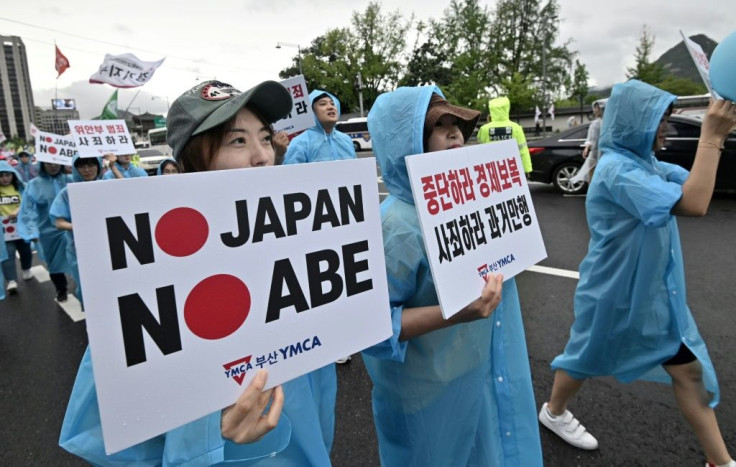Five Things To Know About The Japan-South Korea Intel-sharing Pact

South Korea's decision Friday to "conditionally" extend a key intelligence-sharing pact with Japan will come as a huge relief to the United States, which was deeply troubled by the diplomatic spat between its two main allies in the region.
Here are five things to know about the decision:
With just hours to go until it was due to run out, South Korea announced it would suspend the expiry of a pact with Japan called the General Security of Military Information Agreement (GSOMIA).
Under the pact, originally signed in 2016, the two directly share military secrets, particularly over North Korea's nuclear and missile capacity.
In August, following a sharp deterioration in ties, Seoul said it was no longer in its national interest to continue sharing confidential information with its neighbour.
At the time Tokyo "strongly" protested the move and urged South Korea to reconsider.
Sharing intelligence between the two US allies is especially vital at a time when unpredictable and nuclear-armed North Korea appears to be sabre rattling amid a deadlock in talks with Washington.
Tokyo has said that during missile launches there is a "thorough and careful exchange of information between both sides" that would otherwise be lost.
Analysts say that without the agreement, both militaries may find it more difficult to track missile launches from the regime in Pyongyang.
Scrapping the pact would have been "a huge setback for one of the pillars of East Asia's security that Japan, South Korea and the United States have established", said Kenichiro Sasae, former vice-minister for foreign affairs, negotiator, and ambassador to the US.
Other experts have played down the move, however, noting the United States previously coordinated the flow of sensitive information between the pair anyway, and this would simply have resumed.
The US had pleaded with Japan and South Korea not to allow a deterioration in ties to affect the military-sharing pact, with officials as senior as Secretary of State Mike Pompeo urging the pair to bury the hatchet.
US officials admit privately that the spat between the two complicated diplomacy in the region -- including with North Korea over its nuclear programme.
Defense Secretary Mark Esper said on a recent trip to Asia that the only beneficiaries from the pact being scrapped would be North Korea and China, and urged the two allies to "sit down and work through their differences".
Bitter memories of Japan's brutal colonialisation of Korea between 1910 and 1945 have long cast a dark cloud over bilateral relations.
Japan says a 1965 treaty that normalised relations with a significant financial contribution effectively settled all reparation claims.
But in past months a string of South Korean court rulings ordering Japanese firms to compensate forced labour victims infuriated Japan.
Bilateral ties went further into tailspin in July after Tokyo said Seoul was not properly handling sensitive imports, and took the country off a list of nations that enjoyed streamlined export control procedures.
This enraged South Korea, which hit back with similar moves targeting Japan, before cancelling the intelligence-sharing pact.
Bilateral ties are unlikely to come out of the deep freeze in the near future, said Sasae, but should still be seen as positive over the longer term.
"The current situation is extremely deplorable and extremely regrettable... but the Japan-South Korea relationship has been expanding when seen in a historical perspective," he said.
Anti-Japan sentiment continues to grow in South Korea, however, with protests and boycotts of Japanese goods and a dramatic drop in Korean tourists visiting Japan.
© Copyright AFP 2024. All rights reserved.





















